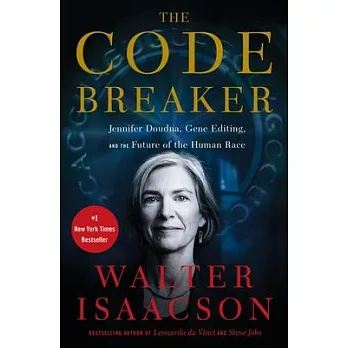《達文西傳》、《賈伯斯傳》作者華特.艾薩克森 又一部精采傳記作品!
她的研究,帶領人類邁向下一個重大革命
2020諾貝爾獎得主、《基因編輯大革命》共同作者珍妮佛・道納,在青少年時期,即對於人類生命的構成感到好奇、對解鎖生命密碼的相關知識產生興趣。多年後,她因劃時代的CRISPR基因編輯技術研究,與同僚艾曼紐爾•夏本提爾共同獲頒諾貝爾化學獎。
艾薩克森帶領讀者深入這位科學家的成長過程和研究生涯,引人入勝地描繪出基因編輯研究的迫切性,並輔以深入、詳實的背景研究,為讀者仔細解釋CRISPR,同時也帶我們看見伴隨這一領域的進展而來的倫理爭議。
過去的半個世紀,是奠基於晶片、電腦和網路的數位時代,而此刻,我們正在進入一場生命科學革命。CRISPR的發展,以及研發新冠肺炎疫苗的競賽,無疑都將加速我們邁向下一個重大創新革命的進程,而道納的故事,如同一部解開了生命之謎、激勵人心又精彩刺激的推理小說,飽含了生命的驚奇,帶我們看見未來的無限可能。(文/博客來編譯)
The bestselling author of Leonardo da Vinci and Steve Jobs returns with a gripping account of how Nobel Prize winner Jennifer Doudna and her colleagues launched a revolution that will allow us to cure diseases, fend off viruses, and have healthier babies.
When Jennifer Doudna was in sixth grade, she came home one day to find that her dad had left a paperback titled The Double Helix on her bed. She put it aside, thinking it was one of those detective tales she loved. When she read it on a rainy Saturday, she discovered she was right, in a way. As she sped through the pages, she became enthralled by the intense drama behind the competition to discover the code of life. Even though her high school counselor told her girls didn’t become scientists, she decided she would.
Driven by a passion to understand how nature works and to turn discoveries into inventions, she would help to make what the book’s author, James Watson, told her was the most important biological advance since his co-discovery of the structure of DNA. She and her collaborators turned a curiosity of nature into an invention that will transform the human race: an easy-to-use tool that can edit DNA. Known as CRISPR, it opened a brave new world of medical miracles and moral questions.
The development of CRISPR and the race to create vaccines for coronavirus will hasten our transition to the next great innovation revolution. The past half-century has been a digital age, based on the microchip, computer, and internet. Now we are entering a life-science revolution. Children who study digital coding will be joined by those who study genetic code.
Should we use our new evolution-hacking powers to make us less susceptible to viruses? What a wonderful boon that would be! And what about preventing depression? Hmmm…Should we allow parents, if they can afford it, to enhance the height or muscles or IQ of their kids?
After helping to discover CRISPR, Doudna became a leader in wrestling with these moral issues and, with her collaborator Emmanuelle Charpentier, won the Nobel Prize in 2020. Her story is a thrilling detective tale that involves the most profound wonders of nature, from the origins of life to the future of our species.



 天天爆殺
天天爆殺  今日66折
今日66折 

























 博客來
博客來 博客來
博客來 博客來
博客來 博客來
博客來 博客來
博客來